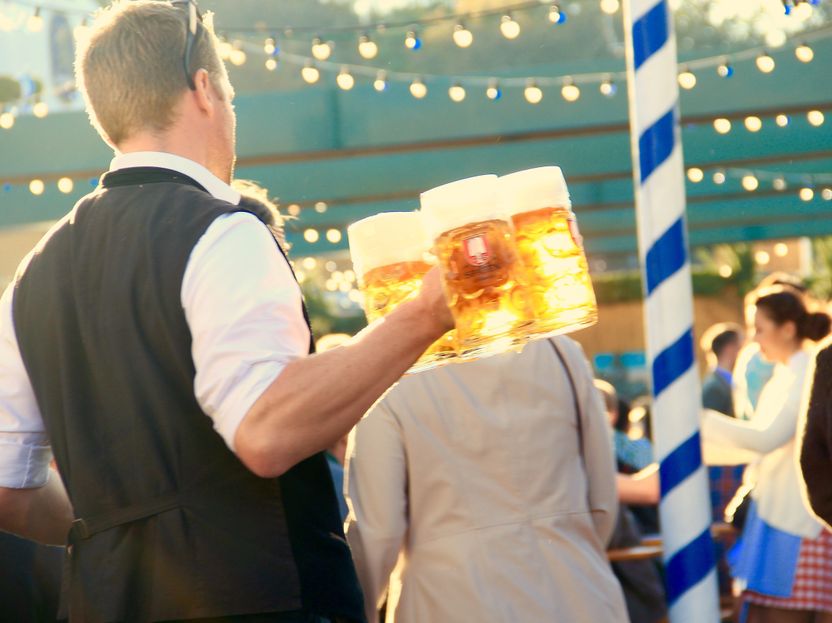Oktoberfest cancelled due to Corona crisis
Already in the 19th century the Wiesn was closed down because of an epidemic
Advertisement
No Munich Oktoberfest for millions of partygoers from all over the world: The famous Oktoberfest has been cancelled for this year due to the Corona pandemic. Bavaria's Minister President Markus Söder (CSU) and Munich's Lord Mayor Dieter Reiter (SPD) announced the decision on Tuesday morning. "It hurts us, it is an unbelievable pity", said Söder. However, a festival of this size, with the international character and under the conditions of the Wiesn, he said, would mean too much danger.

Bild von motointermedia auf Pixabay
The Wiesn 2020 was to take place from 19 September to 4 October, and around six million visitors from all over the world were expected. In Corona times, the danger of infection at the folk festival, with beer tents often filled to capacity and the crowds in the alleys, was now said to be too great.
"We have experienced that the apres-ski in Ischgl, various strong beer festivals for example, or carnival events have unfortunately been virus hubs", said Söder. In this respect the greatest sensitivity applies to festivals. "As long as there is no vaccine, as long as there is no medicine, special care must be taken."
Reiter said that this was an emotionally difficult moment. The Wiesn is the central celebration and the highlight of the year - at least for quite a few people. "And to simply not let it happen is a bitter pill to swallow."
It would also have negative effects on Munich in economically difficult times anyway. Not only showmen, innkeepers and stall owners at the fair itself, but also hotels, restaurants, taxi drivers and retailers will benefit from the fair. According to the city, the Wiesn 2019 had an economic value of around 1.23 billion euros.
Clemens Baumgärtner (CSU), Munich's economic advisor and head of the Oktoberfest, regrets the cancellation, but believes that this is the right way forward. A postponement or a reduced celebration was not an option. "Due to the lengthy preliminary planning and awarding procedures, the Wiesn cannot be postponed or held in a different format.
The Wiesnwirt hosts reacted with great regret, but also with great understanding. "The health of our guests is very important to us and has top priority", said Peter Inselkammer, spokesman of the innkeepers. The refusal also touches the hosts emotionally.
In addition to the Oktoberfest, other Bavarian folk festivals in late summer and autumn are also about to be cancelled, according to Söder. If the Wiesn could not take place, he said, this would also apply to "similar festivals" that were to take place in Bavaria during the same period. "We also think it would be irresponsible to do that there", said Söder.
It is not only about the Oktoberfest, but also about some other festivals which are around the same time, Söder emphasized and also mentioned the Gillamoos folk festival. A little later, the Lower Bavarian town of Abensberg cancelled the festival - it was to start at the beginning of September.
The folk festival with a 700-year-old tradition is known nationwide because on the last day of the festival top politicians perform in the various beer tents at simultaneous rallies.
In Stuttgart, the Cannstatter Volksfest, the second largest folk festival in Germany, is on the brink of collapse. Baden-Wuerttemberg's Minister of Social Affairs Manne Lucha (Greens) said that he expects a cancellation here as well. He said that the greatest danger at the moment is posed by large events. Last year, approximately 3.5 million people had visited the Cannstatter Wasen. The opening of the festival is currently planned for September 25th, it is to last until October 11th.
Munich's Lord Mayor Reiter also emphasized that there could be public festivals, above all of course the Oktoberfest, but "others simply could not exist at this time". Also the Bavarian Central Agricultural Festival, where every four years the farmers present their work, agricultural and forestry technology as well as farm animals on the southern part of the Wiesn area, will not take place.
Meanwhile, the showmen resisted making the Wiesn-Aus a blueprint for other folk festivals. "The cancellation of the Oktoberfest must not be an indicator that other folk festivals in Germany will be forced to cancel from the end of August onwards," demanded the German Showmen's Association. "The festivals are of existential importance for the showmen and for the local population they are a central anchor of their social and cultural coexistence. The Oktoberfest, with its high numbers of visitors and international audience, was also not representative of the 9750 other German folk festivals.
At the latest since the federal and state governments decided last week to ban major events until the end of August, it was clear that this would also mean the end for many folk festivals in autumn - including the Oktoberfest. Even at the end of March it was still said that the intention was to decide on the Oktoberfest as late as possible - at the end of May or the beginning of June. Then the city would have had to issue permits for innkeepers, showmen and market traders. At the beginning of July the construction of the Theresienwiese would have begun.
This is not the first time that an Oktoberfest is cancelled. Already in the 19th century, the Wiesn was cancelled due to an epidemic: Because cholera raged, the festival was cancelled in 1854 and 1873. Even in times of war, there were often no Oktoberfests. During the world wars the folk festival was cancelled, as well as in 1923 during the phase of hyperinflation./sd/DP/stw (dpa)
Note: This article has been translated using a computer system without human intervention. LUMITOS offers these automatic translations to present a wider range of current news. Since this article has been translated with automatic translation, it is possible that it contains errors in vocabulary, syntax or grammar. The original article in German can be found here.
































































